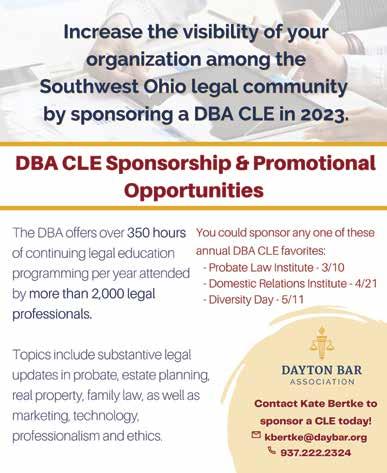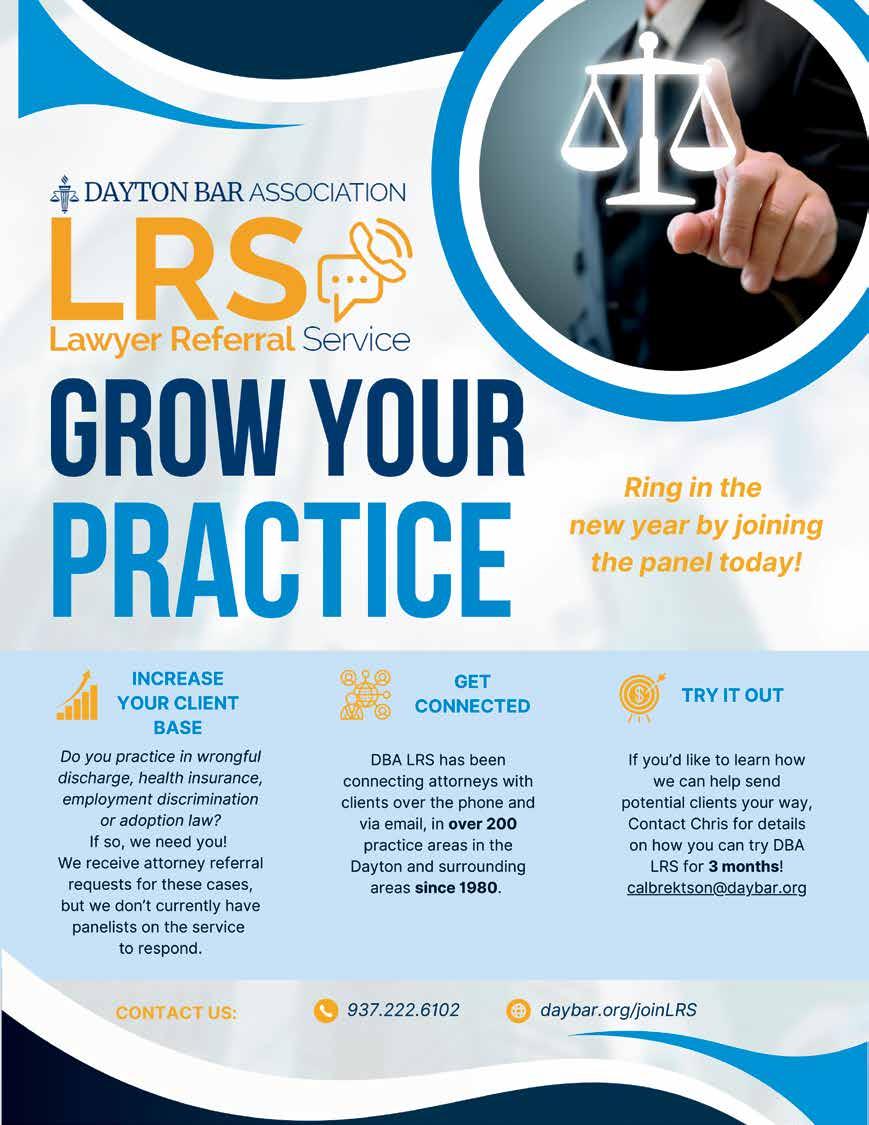
9 minute read
DBA CLE Offerings Save these dates
January CLE:
43pm-4pm | DBA Seminar Room | 2.0 Gen hrs
Advertisement
Presented by the Estate Planning Trust & Probate section
Taxes
5Noon-1pm | DBA Seminar Room | 1.0 Gen hr
Presented by the Workers' Comp & Social Security section
Current Issues in Social Security Law- From Application to Federal Court
69am-11am | Zoom Video Replay | 1.0 Gen hr + 1.0 PC hr Domestic Relations 2022 Year End Roundup
February CLE:
2Noon-1pm | DBA Seminar Room | 1.0 PC hr
Presented by the Young Lawyers Division
Working Parents in the Law
16 Noon-1pm | DBA Seminar Room | 3.0 NLT hrs NLT Core Components
22 Noon-1pm | DBA Seminar Room | 1.0 Gen hr
Presented by Domestic Relations section
DR 101 Part II – Filing a Divorce
11 Noon-1pm | Zoom | 1.0 Gen hr
Presented by the Appellate Court Practice section
Latest Developments Regarding Final Appealable Orders
13 9am – Noon | Zoom Video Replay | 2.75 Gen hrs Judge Steven K. Dankof’s 2022 Criminal Law Update
19 Noon-1pm | DBA or Zoom | 1.0 Gen hr
Presented by the Employment Law section
Unemployment Compensation Appeals
20 9am-Noon | Zoom Video Replay | 3.0 Gen hrs 2022 Federal Court Update with the Judges
24 Noon-1:30pm | Zoom | 1.5 PC hr Secondary Trauma, Burnout and Self Care for Lawyers
25 Noon-1pm | DBA Seminar Room | 1.0 PC hr
Presented by the Juvenile Law, DR, Diversity and Crim Law sections
Trauma Informed Lawyering with Judge Mary Kate Huffman
27 9am-Noon | Zoom Video Replay | 3.0 PC hrs The Ethical Lawyer: Professionalism Standards for Practicing Law Today
Check daybar.org for new Lunch and Learns on Mondays February - May.
March 10th @ Sinclair Conference Center DBA Annual Probate Law Institute
April 14th @ Sinclair Conference Center Domestic Relations Institute
May 11th @ Sinclair Conference Center DBA Annual Diversity Day
May 18th @ DBA Seminar Room DBA First Annual Real Property Institute


By Bonnie Beaman Rice, Social Justice Initiative Chair
A Call to Social Justice
It is not an uncommon stereotype for the public to think of attorneys as being hard-driven; hence, the age-old adage that only a lawyer can draft a 10,000-word document and call it a "brief." It is true that many of us work long hours, tirelessly pursuing, despite obstacles, an outcome in our clients’ best interests; but, what is oftentimes overlooked – or just plain ignored - is the fact that despite our hard driven image, this description does not depict a complete picture of our local bar.
Look at a roster of board members for any number of non-profits and you will see the names of our colleagues listed. Attend a fundraiser for a worthy cause, and you will discover, more often than not, the event chair is one of our peers and the sponsors are attorneys and/or law firms, large and small. In short, I’d like to suggest that while the members of our profession are most certainly “hard-driven, we are, in equal measure, “heart-driven.”
It is for this reason the Dayton Bar Association’s newly-formed Social Justice Initiative (SJI) has been warmly embraced by so many of you. If you’ve not yet signed on to participate, it’s not too late! First, let me clarify the working definition of “Social Justice” which guides this initiative, as adopted by the DBA Board of Trustees.
Social justice” means equal rights and equitable opportunities for all, regardless of race, gender, ethnicity, national origin, religion, age, sexual orientation, gender identity, disability or so cioeconomic status. Proponents of social justice seek to aid those who are underserved, vulnerable, marginalized and/or dispossessed. Examples of social justice issues include civil rights, hunger, safety, poverty, housing, homelessness, education, physical and mental health, environmental concerns, access to justice, and freedom from discrimination and prejudice. The Dayton Bar Association supports efforts to achieve social justice.
Below is a description for each of our SJI endeavors:
1.) Adopt-A-School Project
Under a directive from the DBA Board of Trustees to select a social justice issue and take action to effect meaningful change, it was determined by the SJI committee that our focus would be on helping students in the Dayton Public School system. The framework for the approach to this initiative will be as follows: • assemble teams of approximately 4 attorneys (including judicial members); • each group will identify a team leader; • each team will meet with a DPS high school Principal in order to identify prioritized needs for that Principal’s school; • each month team members will rotate visits to the school to satisfy the pre-designated needs; • if applicable to the needs specified, the visiting attorney will focus on civics education, leadership skills and/or career development; other needs may be literacy help, debate prep, etc. • a common curriculum will be developed, adopted and/or provided to the teams.
If you are interested in this project, please contact the team leaders:
Judge Walter H. Rice| walter_rice@ohsd.uscourts.gov | (937) 512-1502
Summer Hawks | summer@gdvlp.org | (937) 461-3857
2.) Non-profit Clearing House

Under a directive from the DBA Board of Trustees to promote member involvement in community social justice organizations, the SJI committee has chosen to empower our membership to become more involved and supportive of local non-profits by taking the following steps: • create, manage and publicize a list of local non-profits that seek to promote social justice; • to be included on the list an organization must: • be non-partisan, • promote diversity, equity and inclusion (in accordance with DBA existing policies), and • uphold the rule of law. • the list created will identify: • the organization’s mission statement, • DBA members who serve on that organization’s board and who agree to act as a liaison with the Bar, • upcoming events of the organization, as well as volunteer opportunities (including vacant board seats) • Individual organizations will be highlighted in Bar Briefs articles.
If you are interested in this project, please contact the team leaders:
Magistrate Jacqueline Gaines | gainesj@mcohio.org | (937) 225-4063
Arvin Miller | asmiii50@gmail.com | (937) 672-4907
3.) Community Conversations
As noted by the DBA Board of Trustees: due to their training as lawyers, members of the DBA are able to have difficult conversations on controversial topics in a civil manner that provide new insights and encourages critical thinking. By modeling these skills to the community, DBA members can provide leadership on the important issue of civil public discourse.
In furtherance of the above statement, this initiative will: • plan and organize community conversations before live audiences and/ or by zoom webinars, etc. for DBA members and/or the general public; • select topics that comport with Bar policy by presentations that are educational, balanced, and non-partisan;
If you are interested in this project, please contact the team leaders:
Judge Jeffrey Froelich | babafro@frontier.com | (937) 572-2776
Dianne Marx | dianne_marx@ohsd.uscourts.gov | (937) 512-1505
There you have it. Whether your style of lawyering is toward the introvert end of the scale, or the extrovert, we have an option for you because, beneath your hard-driven persona, we know there lies a heart-driven passion.

Civility and Professionalism in the Montgomery County Courts
By The Honorable Kimberly A. Melnick Montgomery County Common Pleas Court kimberly.melnick@montcourt.oh.gov

As a former Montgomery County Prosecutor, I have practiced in the Montgomery County Common Pleas Court for the vast majority of my 28-year career. I have experienced the changes in the relationships between the defense bar and the prosecutor’s office over these years. Now that I’m on the bench, I’m experiencing these relationships from another perspective as well as the relationships between the attorneys practicing in the civil arena.
When I was a young prosecutor, there was at least one Friday a month when several defense attorneys, prosecutors and even a few judges would gather after work. This wasn’t for the purpose of “getting our drink on”, but was for the purpose of camaraderie. We were all friends in the general sense. We fortified these relationships and built trust. This translated to a productive work environment. Attorneys resolved what could be resolved and had trials when they were necessary. While everyone was part of the adversarial process, it was never personal and always professional. Attorneys would passionately argue their cases in the courtroom and then have a drink together when the case was concluded and discuss the inevitable “crazy” things that would unexpectedly come up during a trial.
Let’s face it, times change. The pandemic has shown us just how quickly our lives can be turned upside-down. Even things that were never spoken about, religion and politics, are now causing rifts between family and friends. I’m sure to some I sound like the old attorney who’s speaking of “the good old days”, and wanting things to return to times past. However, that is far from my point. In recent years, the camaraderie outside the courtrooms has waned, but the professionalism and respect have remained intact.
Since taking the bench, I have had more frequent experiences with attorneys that practice primarily in other counties. While I’m sure that the absence of our local bonds plays a large role, I am increasingly dismayed when an attorney arrives in court or participates in a phone conference and is so focused on the fight that they miss the opportunity to make new contacts and forge new relationships. I realize that attorneys must zealously represent their clients. I’m afraid that this has been taken by some to mean that you must forsake all others in that endeavor. In my experience, building relationships with the opposing counsel can only help you represent your clients. Dialogue is everything when negotiating a settlement in both the civil and criminal cases. Give and take goes a long way and respect for others goes even farther.
As a judge, I strive to be fair at all times. I don’t take out an attorney’s behavior on the client. My job is to be even keeled at all times. Judicial temperament is important to me and it comes across to jurors, whether a judge realizes it or not. There are times when this is more difficult than others. I believe that the court should demand respect for the system. A judge, however, needs to earn the respect of the attorneys who practice before them.
Why am I rambling about all of this? In recent months, I have met so many attorneys, mostly in the civil realm, that I have never met before. The OVERWHELMING majority of these attorneys have demonstrated this respect, professionalism and camaraderie. They most certainly do not agree on issues before the court. However, they have held fast to the fact that they are officers of the court and it’s clear that they value the legal system and each other. I’ve never been prouder to be working in Montgomery County.



